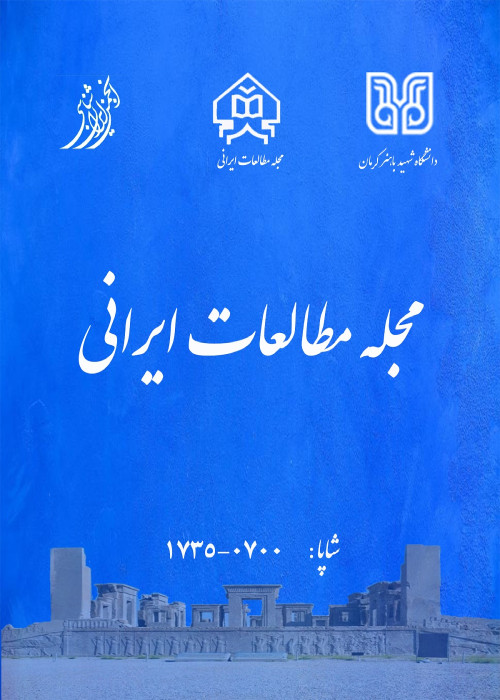The signs of collectivism in Sa'di’s lyric
The lyric is so intertwined with love that it seems this poetic form is specific to the expression of romantic themes. This is true for most Iranian lyric poets, from Rudaki to the poets of the contemporary period. Sometimes, among lyricists, a committed poet such as Hafez has turned to social satire and opposed with hypocritical claimants; or, a poet like Farrokhi Yazdi makes social criticism, and of course, Persian lyric poetry has had one of these types of social lyric poems in different periods. So far, no one has said that there are social issues or themes in Sa'di’s love lyrics. The author does not intend to prove that there are social issues in Sa'di’s lyrics; but, the purpose is to show signs of social life in his lyrics. The present study is not socio-literature because "socio-literature scientifically studies the social essence of literary works, the conditions and requirements of the social context of poets and writers, their ideological, intellectual and cultural position, topics, issues and social orders considered in literary works" (Torabi, 2006, 5) and also "expresses the prevailing socio-cultural condition in that period "(Sotoudeh, 2002, 57). While in this study, only the effect of Sa'di’s collectivist mentality on the content of romantic lyric poetry is examined. A critic says, "some works are good to be criticized by a sociologist, but contrary to some works, the sociologist critic has nothing to say "because the hero has become animated from a poetic feeling, not from society" (Diches, 2009, 562); but, the sociologist reading Sa'di’s sonnets finds a lot of points to be said as it originates from the society and contains social life properties.
This study was carried out in a descriptive-analytical method. First, themes that were about social life were extracted. Then, they were studied and counted for their frequencies.
Sa'di’s lyrics, which are called "the paragon of Persian lyric poetry" (Shamisa, 2006: 210), has social strong properties in two respects: first, Sa'di’s lyrics, as creative poetry and art, has been derived from a sense of social individuality, and the other is that these sonnets contain public perception of beauty and perfection (Ebadian, 1993, 102). Love is the treasure of Sa'di’s lyric poetry; but, the origin of all the issues in his poetry is social and popular (Rastegar Fasaei, 2000, 10). The lover's territory has more signs of social life in Sa'di’s sonnet, and in addition to lover, beloved and rivals, people who are in a society are also mentioned. The first social institution is family; Sa'di is one of the few lyricists who refers to family and speaks of parents (Sa'di, 2006, 228, 278, 281), children (ibid., 268), relatives (ibid., 136), acquaintances and strangers (ibid., 181) in the lyrics. In Sa'di’s lyrics, the voices of the people are heard a lot as 20 verses of Sa'di’s lyrics begin with the phrase “it is said ˮ and then quotes from people are given (Sa'di, 2006, 195, 329, 96, 79) 327, 328, 313, 59, 58, 181, 312, 116, 289, 57, 125, 96, 59, 95, 51, 37, 37). More than 50 verses pf his poems begin with 'the person' (kas) 'a person' (kasi) and 'People' (kasan) and then, a point or quote from people about love and beloved is brought. Romantic scenes are present in Sa'di’s lyrics. It is people who, with their presence, make the sonnet real, so that the reader does not ask himself then where are people? The lover has a house, a neighbor, his own relatives and he makes love in a setting that seems more real than the setting in other poets’ lyrics. In lyrics, it is often difficult to believe romantic words and the exaggerated actions of lover and beloved, and mostly metaphors and symbols, and in general, the virtual language are interpreted and justified. In Sa'di’s lyrics, there are signs of the poet’s sense of originality, which, of course, is almost impossible to be proved scientifically; and, the reader thinks that Sa'di’s has spoken his heart out and that what he says is the reality of his life, and perhaps he has experienced love, and his sonnets are a collection of his romantic experiences. It seems that his collectivism has influenced and strengthened the romantic narration and made it believable in Sa'di’s sonnet. In Sa'di’s lyric poetry, many verses about the beloved are compared with other beauties. The comparison of the beloved with the benevolent also shows Sa'di’s collectivist view; Sa'di doesn't just see his lover; He also considers other good people.
Sa'di’s lyrics are romantic and do not consider political and social issues, but the king of the speech territory has been influenced by his collectivist view in creating themes and meaning of the sonnet, and in many cases, has introduced people in his lyrics. Some recurring themes in Sa'di’s lyrics make it clear that: 1- The presence of groups and personalities such as the public (19 times), cameleer (13 times), neighbor (6 times), relatives, old neighborhood, muezzin, acquaintance, capitalists, etc., shows Sa'di’s collectivism. 2- In many of Sa'di’s lyrics, people talk to the poet and often scold and advise him. Sa'di’s collectivist mind shows the society's perception and attitude towards love by quoting people ʼ speeches. 3- The presence of people in a considerable number of Sa'di’s lyrics has made them romantic to some extent and given a realistic atmosphere to them. 4- Sa'di’s collectivism in lyrics has increased the credibility of lyric themes; describing people's condition in the sonnets, comparing the lover with people and beloved with other beloved has made Sa'di’s sonnets more plausible and pleasant.
“lyric” , “Sa'di” , “pluralism” , “content”
- حق عضویت دریافتی صرف حمایت از نشریات عضو و نگهداری، تکمیل و توسعه مگیران میشود.
- پرداخت حق اشتراک و دانلود مقالات اجازه بازنشر آن در سایر رسانههای چاپی و دیجیتال را به کاربر نمیدهد.



